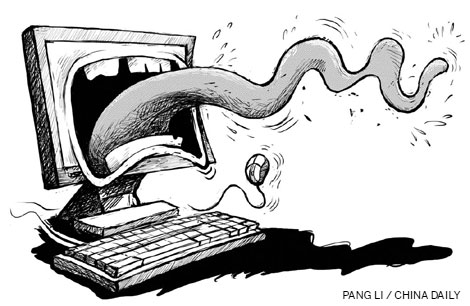Living with the Internet rumor mill
Updated: 2013-05-17 08:34
By William Daniel Garst (China Daily)
|
||||||||

"Falsehood flies, and truth comes limping after it," said the great 18th century writer Jonathan Swift in his essay, The Art of Political Lying. When Swift made his sage observation, the mass circulation press (and its readership) was in its infancy.
More than a century later, a mature print media - the so-called yellow press - sparked the 1898 Spanish-American War by claiming that the USS Maine had been destroyed by a Spanish mine. Modern investigations suggest that the spontaneous combustion of volatile bituminous coal was a more likely cause of the explosion on and sinking of the battleship.
Four decades later, using the then new media of radio, Orson Welles created a mass panic with his "War of the Worlds" broadcast, saying Martians had invaded Earth. After the Lushan earthquake in Sichuan province on April 20, a similar apocalyptic rumor, this one warning that a big quake would destroy the provincial capital Chengdu, needlessly sent many people in Sichuan into a tizzy.
The earthquake rumor, of course, was spread through the Internet. Thanks to the speed at which word travels through the Web and the number of people who surf it today, falsehood really does fly in cyberspace, while truth all too often comes limping after it.
This situation is more or less tolerated in the United States as part of the tradeoff for free expression. Indeed, to successfully prosecute or sue someone for libel, a person has to not only show that the statement made was false, but also prove that it was made with malicious intent. The second criterion is difficult to meet, and anyone who is a "public figure" is fair game for ridicule.
These limited constraints on what individuals can say about others certainly makes it hard for libel victims to seek redress. This is true even for the few who win libel suits such as Steven Pagones, former assistant district attorney of Duchess county, New York state, who was a victim of Reverend Al Sharpton's slander in the 1987 Tawana Brawley abduction and rape hoax.
It is hard to perceive the main human targets of the Internet rumor mill in the US, namely entertainment and sports celebrities, as victims, for most of these people crave and need the spotlight. And rumors flying about a celebrity's private life comes within that territory - this is especially true for so-called reality stars like Kim Kardashian.
Guo Meimei, the Chinese wannabe reality star learnt a stern lesson on how the Web both giveth and taketh away in this area. For some months, this 20-year-old minor actress was doing her best to be China's answer to Paris Hilton, albeit one with humble roots, by flaunting a luxury lifestyle that included expensive sportscars, designer handbags, a posh Beijing Villa and horses.
In a country where many people are angry at the widening socio-economic inequality, Guo's behavior was bound to draw critical attention. But by claiming to be the "commercial general manager of the Red Cross Society of China, Guo turned what would have been an amusing lifestyle fuss into a major scandal involving a reputable charity organization. Enraged netizens began investigating whether charity money had been used to fund Guo's luxury tastes, while financial contributions and blood donations to the organization plummeted.
The Red Cross Society of China's non-transparent functioning and questionable governance were the main reasons why the Guo Meimei affair became so damaging for the organization. Bloggers are thus right to ask how the organization has used the donations.
Moreover, the scandal underscores what People's Daily has said about micro-blogging: "Many hot issues have been exposed through micro blog posts". Accordingly, the government has encouraged micro-bloggers to use weibo because it would help it to fight corruption.
For example, Liu Tienan, a top planning body official, termed a journalist's whistle-blowing report "rumors" in December. But this week, Liu is reportedly facing investigation by an anti-corruption committee thanks to postings on weibo. In another case, however, rumors that "the girl who died after falling from a mansion in Anhui province last week was raped and killed" were scotched after police posted videos on the Internet.
The Web is really a double-edged sword. Though it continues its explosive growth in China, it is likely to become like the one in the US and focus on celebrity gossip in the future. The fascination with celebrities seems, after all, to be universal. To paraphrase former US president Harry S. Truman, entertainment and sports figures unable to take the heat of the Internet rumor mill will need to get out of or altogether avoid the celebrity kitchen, because the two always go together.
The author is an American corporate trainer in China.

 Michelle lays roses at site along Berlin Wall
Michelle lays roses at site along Berlin Wall
 Historic space lecture in Tiangong-1 commences
Historic space lecture in Tiangong-1 commences
 'Sopranos' Star James Gandolfini dead at 51
'Sopranos' Star James Gandolfini dead at 51
 UN: Number of refugees hits 18-year high
UN: Number of refugees hits 18-year high
 Slide: Jet exercises from aircraft carrier
Slide: Jet exercises from aircraft carrier
 Talks establish fishery hotline
Talks establish fishery hotline
 Foreign buyers eye Chinese drones
Foreign buyers eye Chinese drones
 UN chief hails China's peacekeepers
UN chief hails China's peacekeepers
Most Viewed
Editor's Picks

|

|

|

|

|

|
Today's Top News
Shenzhou X astronaut gives lecture today
US told to reassess duties on Chinese paper
Chinese seek greater share of satellite market
Russia rejects Obama's nuke cut proposal
US immigration bill sees Senate breakthrough
Brazilian cities revoke fare hikes
Moody's warns on China's local govt debt
Air quality in major cities drops in May
US Weekly

|

|







